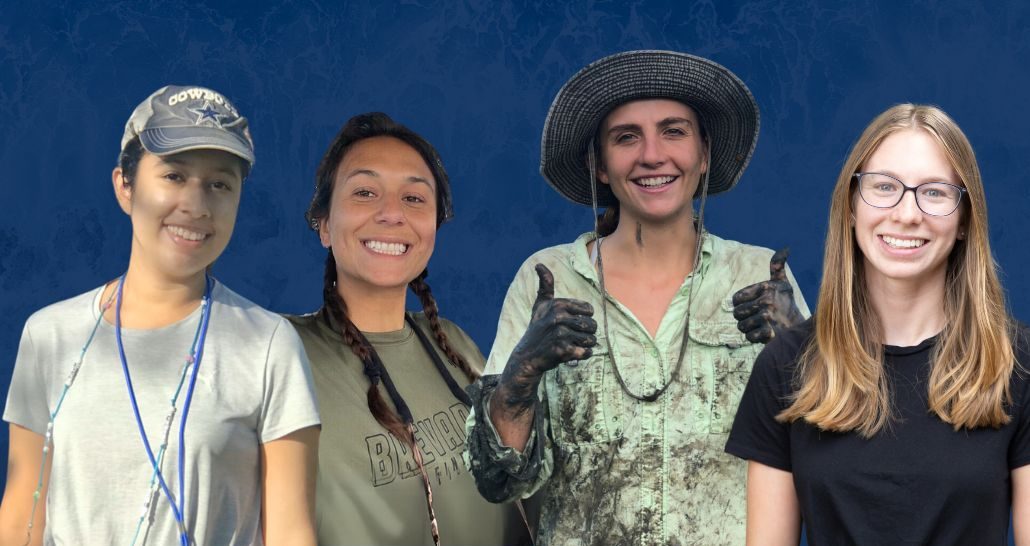In August, we will celebrate the graduation of four outstanding students from UF’s Department of Environmental Engineering Sciences and the Center for Coastal Solutions (CCS). Hallie Fischman, Yvanna Serra, Sara Swaminathan and Sydney Williams are all set to continue their exciting journeys in research. Whether they’re pursuing Ph.D. studies, stepping into faculty roles, or diving into postdoctoral research, their skills, smarts and enthusiasm are sure to make a big impact in coastal conservation. Congratulations to these inspiring young women for their bright futures ahead!
Sara Swaminathan: Gaining confidence through hands-on research
In kindergarten, Sara Swaminathan was already a passionate advocate for the planet. She vividly recalls building tiny homes for insects and organizing a cleanup crew to tidy up the playground — long before she even knew how to spell “environment.”
“I’ve always loved animals and wildlife and it’s been difficult for me to witness them in decline or to see people not consider the impacts of their actions,” said Swaminathan. “I wanted to dedicate my career to conserving the ecosystems that I think are so special.”
Swaminathan’s doing just that and graduates from the University of Florida’s Department of Environmental Engineering Sciences in August with a doctorate degree. Her research focused on how coral reef communities respond to environmental stress, particularly those intensified by human activity, and their ability to bounce back from these conditions.
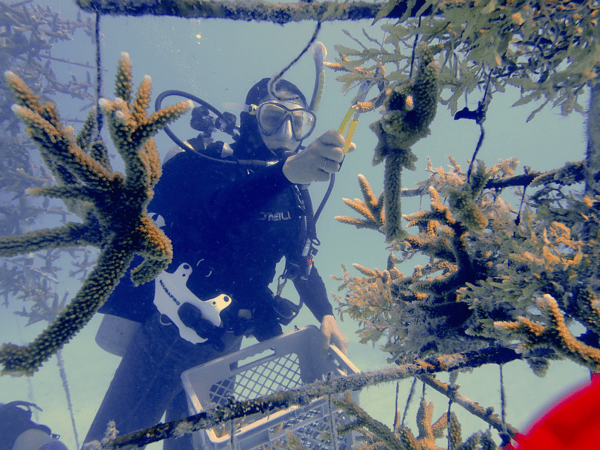
Swaminathan’s journey to marine sciences was not straightforward. During her undergraduate years, she explored both science and art history before discovering a passion for marine biology in her senior year. After earning a bachelor’s degree from the Society and Science Program at Wesleyan University, she dedicated two years to gaining research experience in preparation for graduate school. This included studying the water quality and biogeochemistry of the Puquios — an interconnected system of hypersaline ponds in Chile’s Atacama Desert.
As a graduate student, Swaminathan studied coral reefs in the Florida Keys and the Caribbean, mentored by Andrew Altieri, Ph.D., an assistant professor in the University of Florida’s Department of Environmental Engineering Sciences. For her dissertation research, she took a multi-faceted approach, incorporating three key methods: field experiments at remote sites, analyses of large and diverse data sets, and complex lab experiments. Mastering all three of these challenging techniques is no small feat, and Swaminathan’s success in each speaks volumes about her skill and dedication.
“Sara has shown versatility and depth in her approach to research. She rises to meet any challenge that comes along, whether she’s in unchartered territory or when difficult things present themselves,” said Altieri. “She’s flexible about her objectives or approach when necessary, but she ultimately achieves what she sets out do.”
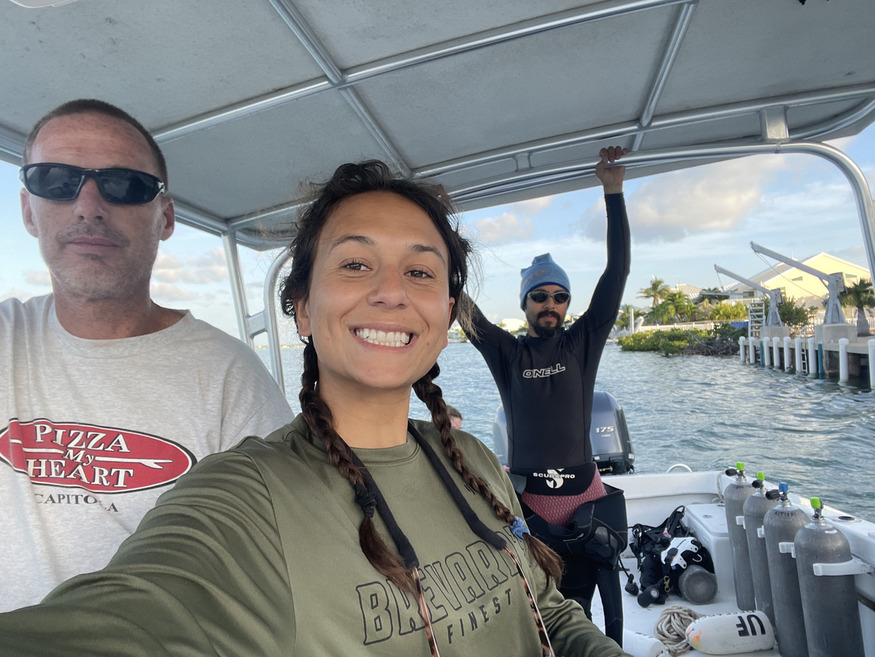
When Swaminathan’s work required her to travel to the Smithsonian Marine Station in Fort Pierce, Florida, she moved from Gainesville to Fort Pierce for a summer to conduct experiments with corals, going into the lab every two hours for days at a time. At summer’s end, when there was additional work to do, she extended her stay to finish up, despite having to be away longer.
“Sara works hard, which sounds basic, but it’s essential,” said Altieri. “She’s positive and collaborative about moving the team forward and has a sense of humor about the work and working with other people. That’s important when you’re working on a demanding project that requires long hours or multiple days, or when you’re in isolation or with a small group. It doesn’t feel like work even when it’s at its most challenging when you’re working with Sara.”
After graduation, Swaminathan will join the Bigelow Laboratory for Ocean Sciences in Maine as a postdoctoral scientist, where she will study the dietary preferences of herbivorous fishes, which may contribute to coral reef health, across gradients of coral reef degradation.
Reflecting on her growth as a graduate student, Swaminathan says her experiences gave her the confidence and skills to pursue a science career.
“My experience at UF has helped me grow into a more efficient and experienced scientist. When I first started my Ph.D., I had never published a paper in a scientific journal, could barely use the programming language ‘R’ and was pretty nervous about public speaking. Now, I am more confident in my ability to conduct research and write papers efficiently, give talks, conduct fieldwork and mentor students, which has prepared me for success beyond my Ph.D. and in my next role as a postdoctoral scientist.”
Yvanna Serra: Finding opportunities to grow
As a master’s student in Environmental Engineering Sciences, Yvanna Serra created a watershed model to pinpoint the causes of water quality issues in the Peace River Basin in southwestern Florida. Her model not only identifies current problems but also simulates land use and climate change scenarios to offer insights into the future of the region’s coastal water quality. Yvanna’s dedication to shaping a better future is the driving force behind her career choice in environmental science.
“Research is the best of both worlds: improving the well-being of humans and the environment,” said Serra. “It’s fun, like solving a puzzle.”

Before joining UF, Serra faced barriers to pursuing a science education in her home country of Panama due to limited research funding. After earning her bachelor’s degree in civil engineering from the Technological University of Panama, she came to UF to deepen her knowledge in science and the environment, and was advised by David Kaplan, Ph.D., a professor in the Department of Environmental Engineering Sciences.
One of Serra’s greatest challenges as a student was learning how to accurately model a range of processes using the soil and water assessment tool (SWAT), a complex watershed model that processes large amounts of data. Learning this new tool took many hours of applying different techniques to use the model effectively — all while working in her second language, English. To improve her scientific writing, she diligently read numerous research papers and actively sought feedback and support from other researchers and peers.

“My experience at UF and CCS has transformed the way I work, think and create,” said Serra. “This opportunity to gain necessary knowledge in hydrology and modeling and learn about a variety of topics has been invaluable for my professional development. Most importantly, the work environment at the CCS and Kaplan lab fostered my confidence, comfort and the freedom to grow.”
After graduation, Serra will continue her studies as a Ph.D. student at Boston University, where she will employ remote sensing techniques to analyze how wetlands will respond to survive sea level rise, extending her focus on environmental research.
“Yvanna is an extremely bright and hard-working student with a fearless attitude about learning new ideas and methods,” said Kaplan. “I know that Yvanna’s can-do attitude, determination and insights will take her far as she takes the next step in her academic career as a Ph.D. student at Boston University!”
Sydney Williams: Paying it forward by mentoring others
Sydney Williams’ dedication to the natural world and her eagerness for learning have fueled her impressive academic journey. She earned an undergraduate degree in cellular biology from the University of Georgia, completed two internships in coastal management, and recently defended her dissertation to qualify for a doctoral degree in Environmental Engineering Sciences from the University of Florida. Williams’ passion and commitment have been the driving forces behind her remarkable accomplishments.
“I gained a lot of experience through my work on the Georgia coast before my Ph.D., but I wanted a deeper understanding of the region’s natural systems. I pursued research because of that,” said Williams. “When I connected with Dr. Angelini, I turned my attention to mussels, a bivalve that doesn’t receive nearly as much attention as oysters, to answer questions regarding their importance and how we could use these animals in conservation and restoration efforts.”
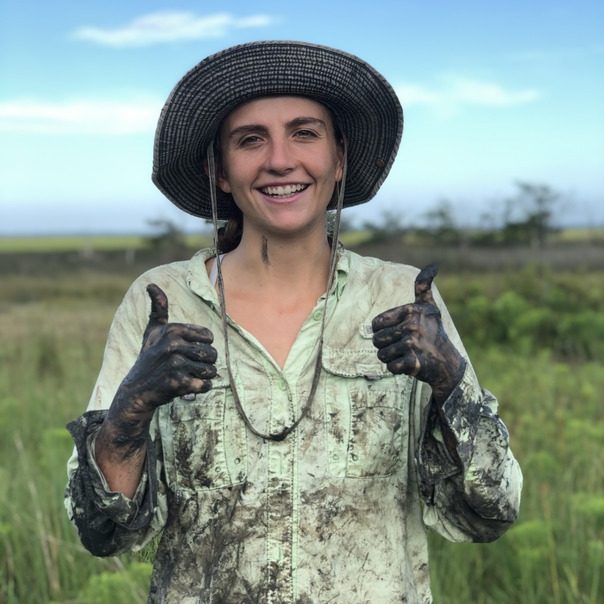
During her undergraduate years, Sydney Williams faced challenges due to a lack of mentorship and guidance as she prepared for graduate studies. At UF and CCS, she found a supportive network that helped her develop a positive, patient mindset. This new perspective enabled her to overcome various obstacles, such as instrument failures, weather delays, compromised field samples, and limited resources. As a graduate student, Sydney has paid it forward by offering strong mentorship to younger scientists, passing on the support she received.
“After years of mentoring, I’ve seen several students really flourish and grow their own path towards understanding the environment and improving its health and functioning,” said Williams. “I think our important experiences and time together inspired them to pursue their own interests with confidence. I’m grateful to still be connected with them today.”
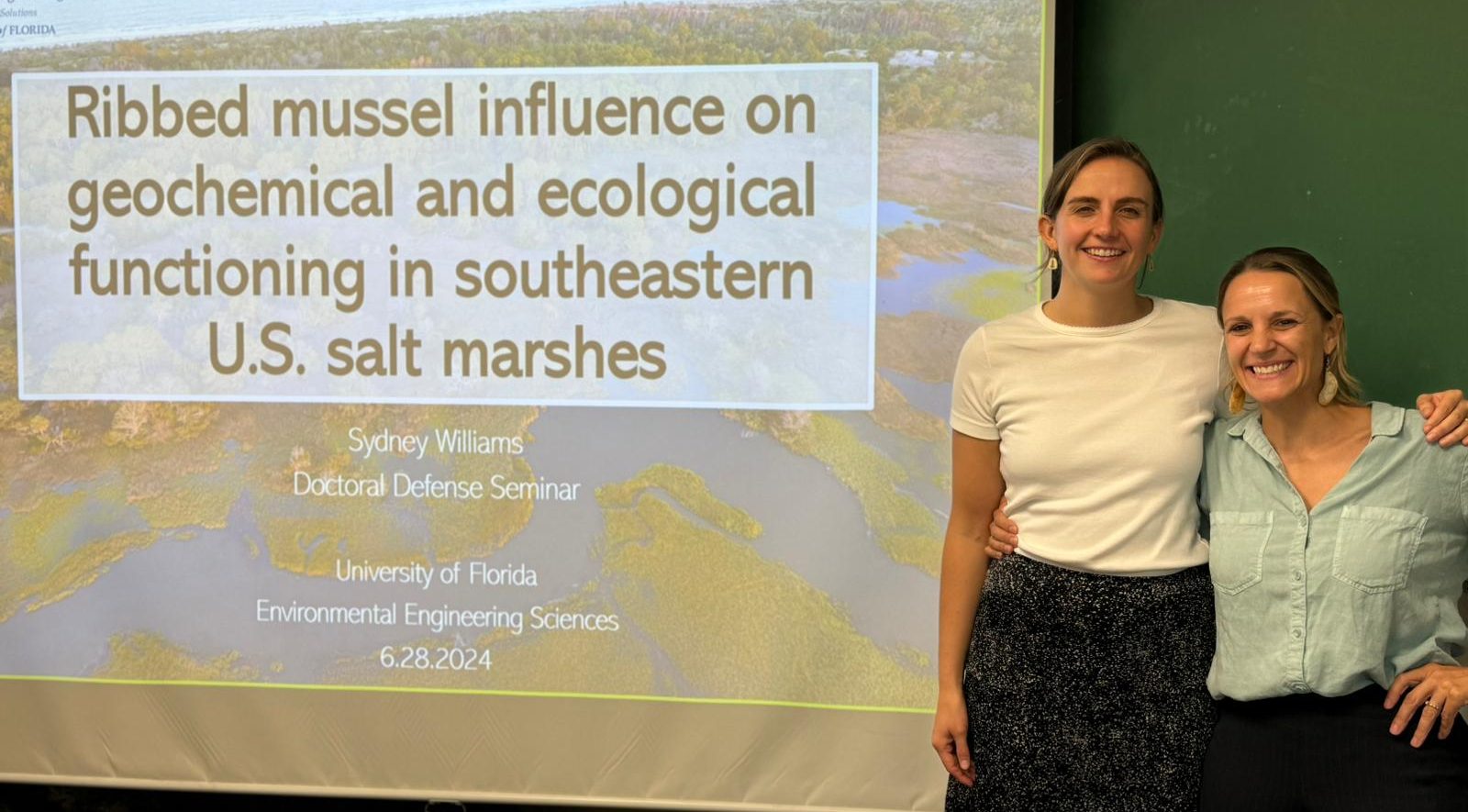
After graduation, Sydney Williams will join the University of Georgia Marine Extension and Georgia Sea Grant as a public service faculty member. In this role, she will focus on bridging the gap between research and coastal communities, with the goal of helping communities build resilience against hazards like increased flooding, rising sea levels, and more frequent, intense hurricanes.
“Sydney is an inspirational and caring mentor, relentless problem solver and community leader,” said Christine Angelini, Ph.D., professor in the environmental engineering sciences and Williams’ advisor. “She cares deeply about the natural world and takes engaging, younger scientists in. It was so fun and productive working with her!”
Hallie Fischman: Intrepid explorer and researcher
Growing up by the beach in Massachusetts, Hallie Fischman developed a strong bond with the environment and a deep appreciation for coastal ecosystems, which inspired her lifelong commitment to their protection. As a graduate student in Environmental Engineering Sciences, she has focused her research on enhancing species interactions to improve the restoration of salt marshes and sand dunes. This work demanded countless hours of data analysis and challenging fieldwork, and Fischman consistently rose to these challenges with determination and resilience.
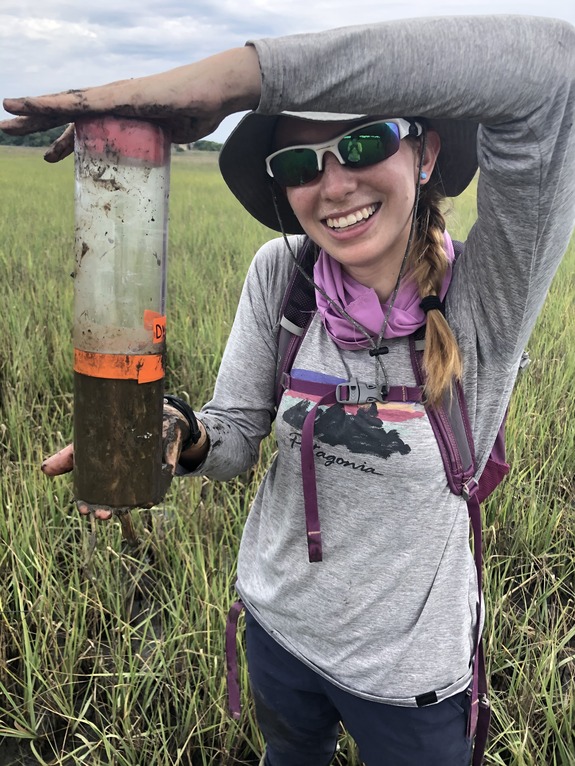
“Hallie fearlessly tackles new challenges,” said Christine Angelini, Ph.D., director of the Center for Coastal Solutions. “As part of research projects, she mapped 79 million oysters and moved 120,000 mussels. Name the challenge and she is up for it.”
Fischman, who earned her bachelor’s degree in biology from Brown University, began working with CCS Director Christine Angelini, Ph.D., in the summer of 2017. During this time, she researched how ribbed mussels contribute to building and stabilizing salt marshes. This experience sparked her ongoing interest in studying species interactions and their applications in sand dune restoration. However, Fischman’s knowledge and commitment to the environment extends well beyond her own research.
“Hallie is a master natural historian whom we look to for insights. We all go to her for knowledge about plants in the dune, or distributions of oysters,” said Angelini. “She is the person with the finger on the pulse about the systems she works in.”
As a student, Fischman has encountered and overcome significant challenges. One of her experiments, initially set to run for about three years, was destroyed by a storm after just six months. Despite this setback, she adapted by revising her research question and setting up a new experiment the following year, which was also washed away. These trials prompted Fischman to explore further questions about dune restoration in areas frequently affected by storms, which ultimately led to a collaborative study with Pete Adams, Ph.D., associate professor in the University of Florida’s Department of Geological Sciences, and Ph.D. student Copeland Cromwell.
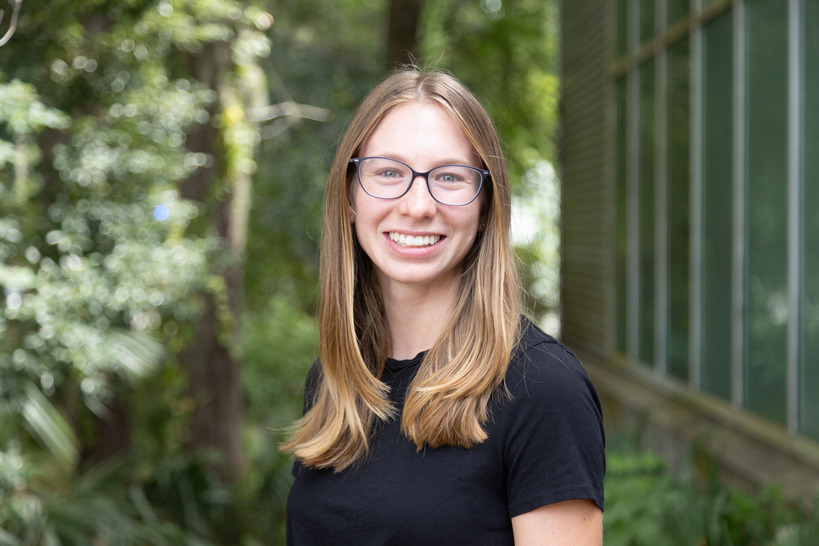
Collaborating with other researchers, industry experts, and government officials has been the most rewarding aspect of being part of CCS for Fischman. The numerous opportunities she’s had to partner on projects have been highlights of her graduate education, enriching her learning experience and fueling her passion for research.
“I’m really proud of how many different projects I have played a role in,” said Fischman. “I’ve done a lot of surveys with the U.S. Army Corps of Engineers where we’ve mobilized large groups of people and gotten through work much faster than I would ever do alone. That has been a really great opportunity from working with CCS.”
Fischman will continue her research as a postdoctoral researcher after graduation. She will be working on an Engineering with Nature® project led by CCS Associate Director Andrew Altieri to protect our coasts, along with several other researchers. Their efforts will focus on improving dune and wetland resilience and discovering new strategies and plans of action for this work.
